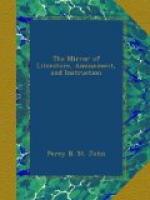Before the introduction of the silk-worm into Europe, and as often as its production is mentioned by the Greek and Roman authors, they had not, for several centuries after the use of it became common, any certain knowledge either of the countries to which they were indebted for this favourite article of elegance, or the manner in which it was produced, By some, silk was supposed to be a fine down adhering to the leaves of trees or flowers; others imagined it to be a delicate species of wool or cotton; and even those who had learned that it was the work of an insect, show by their description that they had no distinct idea of the manner in which it was formed. A circumstance concerning the traffic of silk among the Romans merits observation. Contrary to what usually takes place in the operations of trade, the more general use of that commodity seems not to have increased the quantity imported in such proportion as to answer the growing demand for it; and the price of silk was not reduced during the course of 250 years from the time of its being first known in Rome. In the reign of Aurelian it still continued to be valued at its weight in gold. (See Robertson’s History of India.)
It is a singular circumstance in the history of silk, that, on account of its being an exertion of a worm, the Mahomedans consider it as an unclean dress, and it has been decided with the unanimous assent of all their doctors, that a person wearing a garment made entirely of silk cannot lawfully offer up the daily prayers enjoined by the Koran. (Herbel. Bibl. Orient.) C.V.
* * * * *
LADIES’ FASHIONS.
(To the Editor of the Mirror.)
If you think the following observations conformable to the plan of your useful and entertaining publication, perhaps you may be induced to give them a place, or notice the subject I have in view, in some other way.




